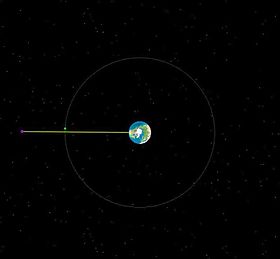
A space elevator is a proposed type of space transportation system.
The concept of a space elevator was first published in 1895 by Konstantin Tsiolkovsky. His proposal was for a free-standing tower reaching from the surface of Earth to the height of geostationary orbit. Like all buildings, Tsiolkovsky's structure would be under compression, supporting its weight from below. Since 1959, most ideas for space elevators have focused on purely tensile structures, with the weight of the system held up from above by centrifugal forces. In the tensile concepts, a space tether reaches from a large mass (the counterweight) beyond geostationary orbit to the ground. This structure is held in tension between Earth and the counterweight like an upside-down plumb bob.
To construct a space elevator on Earth the cable material would need to be both stronger and lighter (have greater specific strength) than any known material. Development of new materials which could meet the demanding specific strength requirement is required for designs to progress beyond discussion stage. Carbon nanotubes (CNTs) have been identified as possibly being able to meet the specific strength requirements for an Earth space elevator.